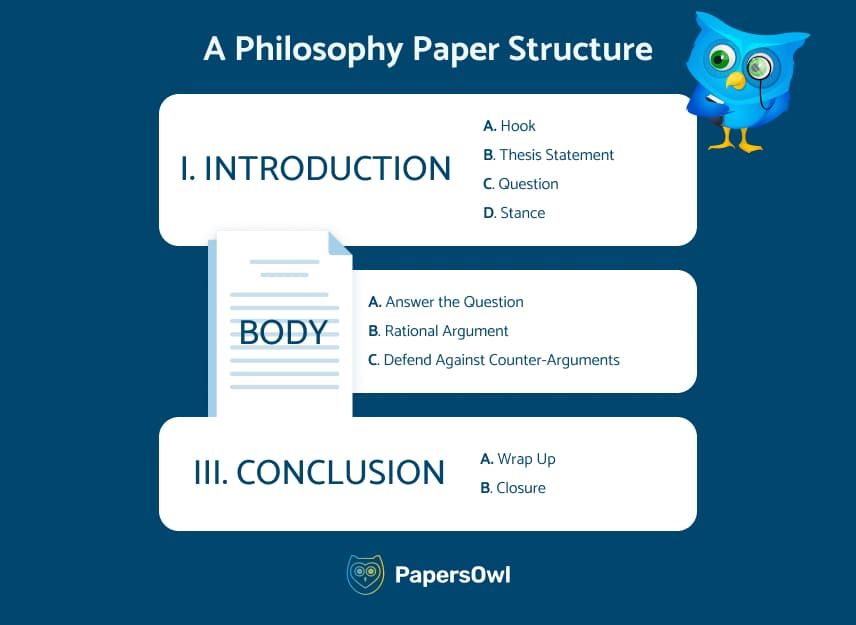How to Write a Philosophy Paper: Bridging Minds
Table of contents
- 1 What is a Philosophy Paper?
- 2 Philosophy Paper Outline Structure
- 3 Template for a Philosophy Essay Structure
- 4 How to Format a Philosophy Research Paper
- 5 10 Steps to Write a Great Philosophy Paper Like a Pro
- 6 How to Select the Best Philosophy Essay Topic?
- 7 Easy Philosophy Paper Topics
- 8 Let Your Philosophy Paper Shine
As a college student who has decided to take a philosophy course, you may be new to this science. A philosophy assignment may seem hard, and this subject is indeed pretty difficult. You read some text, but what you read is just one level of the text, as you need to think critically and analyze what the author is trying to get across. It also involves a lot of analytical and deep thinking. Thus, it is difficult to do an assignment unless you fully understand the text. If you struggle with the technical requirements like citation styles (which are often APA), APA paper writing services can offer essential support. Don’t freak out if you have little experience with this subject, as we have prepared a comprehensive guide on how to write a philosophy paper, from which you will know:
- The essence of philosophy paper, its structure and format
- Why it is important not to omit the outline stage
- Practical tips on writing a philosophy research paper.
What is a Philosophy Paper?
A philosophy research paper is an academic work that presents a comprehensive exploration of a specific philosophical question, topic, or thinker. It typically involves the analysis of arguments, the articulation of one’s own positions or perspectives, and the evaluation of philosophical texts and ideas. The primary objective of such a paper is to contribute to the understanding of philosophical issues by critically examining existing views, offering new interpretations, or developing novel arguments. The paper is characterized by rigorous logical reasoning, clear articulation of ideas, and grounding in relevant philosophical literature.
Drafting a philosophy essay begins with appreciating precisely what a philosophy research paper entails. It involves taking a definite position on a philosophical topic and defending that viewpoint with a logical, irrefutable claim. A good research essay generally uses rational arguments to lead readers down a path to a conclusive, hard-to-contradict resolution.

Philosophy Paper Outline Structure
Writing a quality philosophy paper means beginning with a first-rate outline. The best philosophy paper outline is straightforward in its intent, takes up a position, and is uncomplicated in its language. A proper outline makes drafting easier and less time-consuming. Moreover, philosophical writing with a clear-cut outline will lend assurance that your end result is condensed yet enlightening.
After determining a format, you are ready to begin writing out your philosophy paper outline. The first step in this process is to determine how to choose a topic for a paper. Great papers are those that the writer is most interested in. Once your topic has been chosen, your outline can be written with specific details and facts. Said specifics will take your introduction, body, and conclusion through an easy-to-follow guide.
Philosophy Research Paper Introduction
Your research essay should begin with a striking and attention-grabbing hook. It should identify your topic of focus in some way and ensure that readers have the desire to continue on. The hook is intended to smoothly transition to your thesis statement, which is the claim your thesis is venturing to prove. Your thesis statement should lead readers to the question of research – the distinct question that will be wholly explained in the body of writing. Finally, your introduction for the research paper will close with your stance on the question.
Body Sections
The body aspect of a philosophy thesis is considered the meat of any paper. It is hard unless you find someone to write my philosophy paper for me. This element is where most of the logic behind your stance is contained. Typically, bodies are made up of 3 sections, each explaining the explicit reasoning behind your position. For instance, the first chunk of the body will directly and logically answer the question posed.
In your second body section, use statements that argue why your position is correct. These statements should be informed, prudent, and concise in their reasoning, yet still presented without overly fancy lingo. The explanation of your argument should not be easily opposed. It should also be succinct and without fluff, insulating the explanatory material.
The third portion of the body section should defend your thesis against those that may have counterarguments. This will be the backbone of the essay – the portion that is too hard to refute. By ensuring that criticisms are properly and utterly denounced and the thesis is ratified, philosophical writing will begin to reach its end – the conclusion.
Writing a Philosophy Paper Conclusion
The conclusion is ultimately meant to tie the entire work together in a nice, coherent fashion. It should start with a brief rehash of the body section of your essay. Then, it will move into explaining the importance of the thesis and argument as a whole. Quality conclusions are ones that will offer a sense of closure.
Template for a Philosophy Essay Structure
A suggested template to help guide you when writing out a philosophy outline is as follows:

The use of the above outline template is sure to help with the overall drafting procedure of philosophical writing. Understanding the proper use of the outline is ideal for the best end product.
Putting an outline to use makes the process of writing a philosophy paper much more simple. By using an outline to navigate your thoughts as you write, your essay nearly composes itself. The addition of detail to an outline as it is written provides pronounced facts and a full outline. Take the outline chock full of thoughts and ideas, add words and transitions, and you have a complete paper.
How to Format a Philosophy Research Paper
Formatting a philosophy paper starts with choosing a citation style. The choice between APA, MLA, and Chicago styles simply lay out citations in contrasting manners for your philosophical writing. Each of these styles requires a differing method of citing sources and varying types of organization. Most commonly, philosophy research paper citations are done in MLA or Chicago. While both are accepted, it may be best to choose which your supervisor requires.
10 Steps to Write a Great Philosophy Paper Like a Pro
Learning how to write a philosophy research paper outline is a skill that can be carried over to numerous other subjects. While philosophical writing is a bit different than most other topics of discussion, the outline can be applied to others fairly easily. Proper utilization of outlines makes for a well-thought-out and structured thesis work that a writer can be proud of.
Choose a Topic
One of the primary steps is choosing a topic, and that is the first thing college students get stuck on. If you can not choose a topic you are interested in, talk to your university professor. You can also take a look at different lists of ideas on the Internet.
Read the Material and Take Notes
Read all materials carefully and take notes of important ideas. It is a good idea to read the material a couple of times as there will always be something you don’t notice at first. It is important to have a clear understanding of what you read to nail your assignment. If you feel like you don’t understand anything, then Google ‘write my philosophy paper for me’ and get help from real professionals.
Think about Your Thesis
Before you start writing, realize what you are going to show. Your work should have a strong thesis that states your position. The central component of the work is a clear thesis statement followed by supporting claims.
Make an Outline
An outline should include your ideas for the introduction, your thesis, main points, and conclusion. Having a philosophy paper outline before working on the assignment can help you stay focused and ensure you include all major points.
Make a First Draft
Don’t worry about perfection at this stage. Instead, focus on getting your ideas on paper. Following your outline, start building your arguments. Make sure to provide evidence or reasons for your claims.
Work on the Sections
Introduction: An introduction for a research paper is an essential part of any assignment because it gives your readers an overview of your work. It is your opportunity to grab their attention, so take this step seriously. Remember the thesis statement? You should present it here.
Main body: In this part, you need to present arguments and support your thesis. Start with providing a clear explanation of the philosopher’s ideas and move to the evaluation. Support your thesis by using examples.
Conclusion: A conclusion for any research paper is where you restate your central thesis. It should look like a mirror image of the introduction. Here you need to summarize the major points of your work.
Engage with Counterarguments
A good philosophy paper not only acknowledges opposing views but also presents problem solution ideas that address these perspectives. Make sure to address these counterarguments and provide reasons for why you believe your stance is more compelling.
Don’t Niglet Citations
Citations serve as a bridge. They link your ideas to the broader world of philosophical discourse, allowing readers to trace back your sources and delve deeper if they wish. Always remember, that citations are more than a mere formality. They correspond to specific ideas, arguments, or facts you present in your paper. This means every claim, idea, or quote you borrow from a philosopher needs to be clearly linked to its source. In this way, you will be sure that your work will be free of plagiarism.
Check Formatting Guidelines.
It’s also crucial to maintain consistency in your citation style. Whether you use APA, MLA, or Chicago, stick to one style throughout your paper.
Revise and Proofread
Once you finish your masterpiece, it is time to edit and proofread the research paper. We recommend you put your work aside for a few days to have a fresh perspective when start editing it.
How to Select the Best Philosophy Essay Topic?
First of all, we recommend deciding on a direction that interests you more. It can be a theoretical aspect, applicative use of philosophy or even the integration of this science with others – for example, ontology or metaphysics. After all, it is essential to reflect your thoughts correctly in writing for any direction. You will need to use writing tools for students to show your judgments accurately in the essay. Sometimes this can be a difficult task when the authors of the papers get into a so-called flow state.
Secondly, choosing a good topic that can be compared with the opinions of already-known thinkers is necessary for a deeper justification of your point of view. To do this, use the appropriate essay quotation format to make your paper easy to read. After all, while we are not recognized philosophers, proving our claims will be helpful to get the highest score.
If you still need to get philosophy essay ideas, continue reading this article. Here you will find 70 interesting topics that you can use as a topic for your essay or get inspired to create your own.
Easy Philosophy Paper Topics
Often we want to avoid reinventing the wheel. We are interested in writing an exciting but easy essay. So, if you were looking for simple philosophical essay topics, here is the list of the top 10 topics in philosophy for your paper:
- Human Responsibilities in Different World Religions: Why are They Distinct?
- Good and Evil: Do They Have Anything in Common? Will They Be Able to Insulate One without the Other?
- Advantages and Disadvantages of a Hedonistic Approach to Life
- Life after Death: Should We Endure the Circumstances of the X-axis for a Better Future on the Y-axis?
- Why Ancient People Asked Themselves the Same Questions as We Do: Isn’t Humanity Progressing?
- Do We Fulfill Our Moral Obligation to Parents by Helping Children?
- Three Features: Each from an Animal and an Angel. What is the Nature of Man?
- Is Genetic Engineering Ethical with Respect to the Laws of Nature?
- How Society Can Influence the Personal Choice of the Sense of Life for Each of Us
- Self-Determination of a Person & the Formation of our Microuniverse
Argumentative Philosophy Essay Topics
If you think more analytically, use it to your advantage. The argumentative type of philosophy essay is an unusual and exciting option for such papers since it requires strong thesis statement points. If you want to write exactly this sort of essay, these essay topics ideas will come in handy to decide on the topic of your work:
- Peaceful Protests/Desperate Battle: a Critical Analysis of the Philosophy of Resistance
- The Borderland Situation and Absurdity: Analytical Review.
- Explanation of the Path of any Subject to the Point of No Return. A Critical Analysis of “The Myth of Sisyphus” 1942.
- The Paradox of Absurdity and How to Find a Way Out of It: Follow the Rules or Set Yours
- Comparative Analysis of Forms of Globalization from the Point of View of Philosophy
- E. Leroy, P. Teilhard de Shader and Volodymyr Vernandskyi: Together About the Noosphere, Separately About its Functioning.
- Analysis of the Origins of the First Thinkers from the Point of View of Metaphysics.
- The Legal Aspect of Organ Cloning and Entire Human Cloning. Does it Make a Difference?
- Are People Obliged to Always Tell the Truth and Nothing But the Truth?
- Is Experience Acquired through Lived Years or Situations? Explanation of Each of the Parties.
Plato Essay Topics
Plato and Aristotle were the founders of philosophy in their classical sense. That is why writing an essay that will outline or refute Plato’s reasoning is a surefire option to impress your teacher and stand out from the rest of the group. If you still don’t know what to write about, below are the topics in the philosophy type of paper:
- Understanding a Being as a Multiplicity of Organic Elements According to Plato’s Postulates.
- Reflection of the Philosophy of Truth As an Idea: Plato’s Teaching
- Plato’s way of Familiarizing themself with the Truth through Memories
- Is It Possible to Trace the Influence of Socrates on Plato’s Philosophy: a Detailed Analysis
- Truth Exists, but It does not Exist until Being Developed – the Main Contradiction of Plato’s System of Philosophy Understanding
- “Phaedo”: Philosophy is the Science of Death.
- Plato’s Dialectic: Philosophy is the Cornice that Crowns All Our Knowledge
- Platonic Vision of Four Types of Dialectics as Four Modes of the Soul Activity
- A Move Against Democracy from the Platonic Postulates of Understanding the State and Society According to Personal Philosophy
- Plato and the “Ladder of Love” in the “Banquet”: Beautiful Bodies, Souls, Tempers and Sciences.

Worldview Essay Topics
Worldview and philosophy are similar concepts; they are rooted in the history of the human race. That is why this type of essay is interesting for both writing and reading. Choose your worldview essay topic from the options below to create your perfect piece of writing:
- Three-Aspect Structure of Worldview: Elements, Levels, Main Subsystems
- Mythological and Religious Types of Worldview: What do They Have in Common?
- Worldview as an Individual Prism of Multilevel Interaction Between Man and the World
- The Influence of Previous Generations on Modern Prejudices of our Outlook
- Ideological Form of Globalization. How does Social Media Affect It?
- The Noosphere as a Part of Countering Global Warming
- Modern Beauty Standards and the Bodily Phenomenon of Existence: What is the Connection between Them?
- Human Rights. Philosophy and Ethics
- Religious Beliefs as a Form of Philosophy Existence
- A Complex and Fragmented Approach to Studying the Worldview of Different Nations
Transcendentalism Essay Topics
Transcendentalism, as a new stage in the formation of philosophy, played a key role in its modern appearance. If you are more inclined towards more modernist lines of philosophy, these topics will suit you perfectly:
- Classical German Philosophy. Rational and Intelligent Thinking
- Subjectively Realistic Description of the Environment According to Categories of Philosophy
- The Influence of Transcendentalism on the Ongoing Development of Philosophy Accordingly to the Categories of Multiplicity and Necessity
- 10 Categories Denoting Deep Connections in being Relative to Transcendentalism: What Unites and Distinguishes Them
- Scientific Contemplation as a Mental Category through the Prism of the 20s Years of the 20th Century
- Life at the Intersection of the Past and the Future: Influence on Currents of American Transcendentalism Philosophy
- Modes of Perception of Time & Time as Duration: New ideas of Transcendentalists or Paraphrasing of Hegel’s Postulates?
- Ontological Doctrines and their Essential Characteristics: Henry David Thoreau
- Concepts of Understanding Space and their Qualitative Changes Relative to New Views on Philosophy
- Nature for Self-Sufficiency as the Main Myth of Philosophy Currents at the Beginning of the 20th Century
Practical Philosophy Essay Topics
The theory is great. However, any science’s practical and applied meaning is interesting for each of us. If you are interested in delving into the use of philosophy in modern society, these topics will not leave you indifferent:
- Everyday/Life Level of Philosophy
- Philosophy of Principles. What does It Mean to be Guided by a Certain Life Principle?
- Approach of Philosophy to the Life of Tibetan Monks – does It Correlate with Reality?
- Prejudice against Residents of Third World Countries: Reasons for Contempt for Their Mentality and Lifestyle
- Unpreparedness of College Teachers for Changes in the Education System: What are They Afraid of?
- Truth as the Last Instance of Communication with People. Is It Always Necessary?
- The Philosophy of Excessive Consumption in the USA. What Basis does it Have?
- Does the Concept of One’s Opinion Exist in the Era of Oversaturation of Information?
- The use of Ancient Greek Postulates in Philosophy Today – is the Appeal to Classical Canons Still Relevant?
- The Concept of Ethical and Moral Principles in the Era of Excessive Permissiveness.
Enlightenment Essay Topics
Enlightenment played a huge role in all sciences and spheres of human life. It’s a mind-blowing theme to write about. So, if you were looking for some ideas for your Enlightenment essay topic, we’ve prepared the best ones for you:
- Does the Urge to Study and Develop the Beautiful in Man Still Influence Modern Philosophy?
- Empiricism and Rationalism: Julien Aufre de Lametre’s Attempt to Unite Them
- The Concept of Atheistic Speech of Enlightenment: Religious Dogmatics Debunktion by Voltaire
- Voltaire: Ignorance, Fanaticism, Delusion and Lies Are Cultivated by Christianity
- The State as a Level of Inequality between the Rich and the Poor, According to Rousseau’s Views.
- The Immense Book of Nature as an Object of Knowledge According to Denis Diderot
- The Structure of Existence through Its Concepts: Elements, Substratum, Substance, Objective Reality beyond Human Consciousness and the Condition of Multiplicity.
- Concepts of Understanding Space and Time in Enlightenment Philosophy
- “Molecular Motion” by Paul Holbach: What is It?
- Social Life Based on the Principles of Reason and Justice – “About Reason” Andrian Helvetius
Let Your Philosophy Paper Shine
Good philosophy research paper writing requires some craft and care. Edit your work until it feels right, and make sure you are confident about your claims. If this science is just not your thing, or you struggle to understand it and doing assignments is sheer torture for you, then do my assignment by ordering a philosophical work crafted by real professionals! The best way to approach your assignment is to leave it to experts and forget about your problems.






